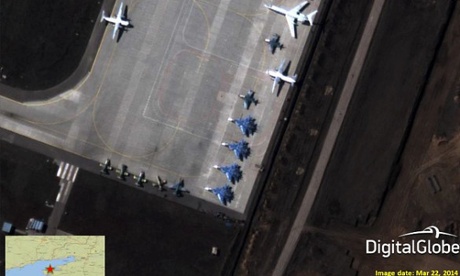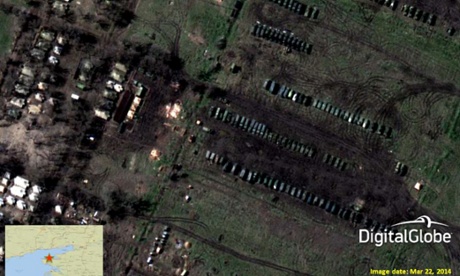Sending In The Troops
"An operation in eastern Ukraine would be very costly from the military point of view and its success is not guaranteed."
"It will be a much more complicated task than the Crimea operation. Crimea is a peninsula and almost an island, which is easy to close and defend. Eastern Ukraine is a vast territory with transparent borders."
Ruslan Pukhov, adviser to the Defence Ministry, Moscow, head Centre of Analysis of Strategies and Technologies

"A Ukrainian invasion would leave Russia mired in conflict."
"The optimal case scenario for the Kremlin will be to help destabilize the political situation in the three eastern regions to enable them to deploy troops in Ukraine without any resistance."
Nikolay Sungurovsky, director, military programs, Razumkov Centre for Economic and Political Studies, Kyiv
"I think there will be serious bloodshed should Russia decide to intervene militarily. The situation is very different from Crimea."
Svante Cornell, research director, Central Asia-Caucasus Institute and Silk Road Studies Program, Stockholm

"We won't see a classical military operation or the appearance of regular units anytime soon, and if things get worse, you might see unmarked units like those in Crimea."
"There'll be a lot of pressure on the defence and security establishments in Kyiv not to let east Ukraine go. I don't think there will be inaction the way we saw in Crimea."
Marcin Zaborowski, director, Polish Institute of International Affairs, Warsaw
Crimea proved to be easy pickings. Russian speakers make up about 77 percent of Crimea's population of over two million. In eastern Ukraine, not so. There 44 percent are Russian speaking in the Kharkiv region, according to 2011 census figures. The masses that turned out in passionate support of a referendum, voting to secede from Ukraine in Crimea will most certainly not materialize in east and south Ukraine.
Still, they don't really have to, after all. All that has to happen, and this has been deftly arranged, is for a small number of Russians and Russian speakers to make themselves highly visible as anti-Ukraine protesters, baiting the government of Ukraine to take physical measures that might result in violence, to bring Moscow to the point of ordering the 40,000 Russian troops and war machines on the border into Ukraine to 'protect' Russian interests.
Vladimir Putin is challenging the temporary Russian administration to exert control over the region, to reclaim the government buildings that have been occupied by dozens of protesters, hardly representative of the population, but out to aggravate the situation to a standoff with authorities in an incitement meant to bring Russia to their rescue. So far, Ukraine's government has been restrained and has acted coolly enough, while still maintaining their authority to remove some protesters and wait out others.
The 40,000 Russian soldiers on standby should their president call them to action are, of course, on military manoeuvres that just happen to be taking place on the border, nothing more. They are, incidentally, handy should they be required in defence of Russia's interests. And the squeeze, at the same time, is on Ukraine to come up with cash to pay not only what Gazprom claims is owed it, but any future gas must be paid for in advance, at an 80% higher rate than previously.
In addition to which the European Union is experiencing the pain of being informed that due to 'problems' with the pipeline crossing Ukraine, Russia may find it inconvenient to supply its customers in Europe with the full complement of their energy needs. This is not a new tack, it is one that Europe, usually in the depths of winter, has experienced time and again any time that Russia has become exasperated with an 'intransigent' Ukraine.
Ukraine is left to wonder what is next; will it be invaded, or will it not? The pro-Russian protests storming administrative buildings in Donetsk, Kharkiv and Luhansk are surely meant to lead to further events, but what, exactly...? In the meanwhile, matters concerning their largest trading partner for a country that is desperate for income, are not going so swimmingly since Putin imposed bans on goods from cheese to chocolate.
The EU sanctions targeting Russia's energy, banking and mining industry are set to be enlarged and dig deeper should Russia intervene further into Ukraine. Should that occur, though Ukraine would be facing off in a military struggle against a much larger, better armed adversary, there would be pain and blood shed on both sides. And the reaction of the international community, though loathe to intervene directly, is impossible to imagine.
But even without a move to enter Ukraine, the massive buildup of troops and tanks and planes across the border has a major psychological effect encouraging separatists to action, while intimidating the government of Ukraine which Moscow will not recognize. The spectre of armed troops entering Ukraine in uniform absent insignia, to begin occupying east and south Ukraine represents a staggeringly wretched spectacle of a powerful nation gone berserk with territorial greed.
In Ukraine's east, 61 percent are opposed to Russia's decision, should it occur, to send in its army to protect Russian speakers, while in southern Ukraine, an even more robust 67% oppose such a move, according to a poll by the International Republican Institute.
Labels: Aggression, Conflict, European Union, Russia, Sanctions, Secession, Threats, Ukraine

<< Home